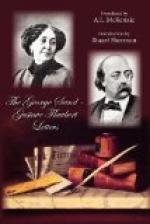My novel is going very badly for the moment. That fact added to the deaths of which I have heard; of Cormenin (a friend of twenty-five years’ standing), of Gavarni, and then all the rest, but that will pass. You don’t know what it is to stay a whole day with your head in your hands trying to squeeze your unfortunate brain so as to find a word. Ideas come very easily with you, incessantly, like a stream. With me it is a tiny thread of water. Hard labor at art is necessary for me before obtaining a waterfall. Ah! I certainly know the agonies of style.
In short I pass my life in wearing away my heart and brain, that is the real truth about your friend.
You ask him if he sometimes thinks of his “old troubadour of the clock,” most certainly! and he mourns for him. Our nocturnal talks were very precious (there were moments when I restrained myself in order not to kiss you like a big child).
Your ears ought to have burned last night. I dined at my brother’s with all his family. There was hardly any conversation except about you, and every one sang your praises, unless perhaps myself, I slandered you as much as possible, dearly beloved master.
I have reread, a propos of your last letter (and by a very natural connection of ideas), that chapter of father Montaigne’s entitled “some lines from Virgil.” What he said of chastity is precisely what I believe. It is the effort that is fine and not the abstinence in itself. Otherwise shouldn’t one curse the flesh like the Catholics? God knows whither that would lead. Now at the risk of repetition and of being a Prudhomme, I insist that your young man is wrong. [Footnote: Refers to Francis Laur.] If he is temperate at twenty years old, he will be a cowardly roue at fifty. Everything has its compensations. The great natures which are good, are above everything generous and don’t begrudge the giving of themselves. One must laugh and weep, love, work, enjoy and suffer, in short vibrate as much as possible in all his being.
That is, I think, the real human existence.
XXXIII. TO GUSTAVE FLAUBERT, at Croisset Palaiseau, 29 November, 1866
One need not be spiritualist nor materialist, you say, but one should be a naturalist. That is a great question.
My Cascaret, that is what I call the little engineer, will decide it as he thinks best. He is not stupid and he will have many ideas, deductions and emotions before realizing the prophecy that you make. I do not catechise him without reserve, for he is stronger than I am on many points, and it is not Catholic spiritualism that stifles him. But the question by itself is very serious, and hovers above our art, above us troubadours, more or less clock-bearing or clockshaped.




